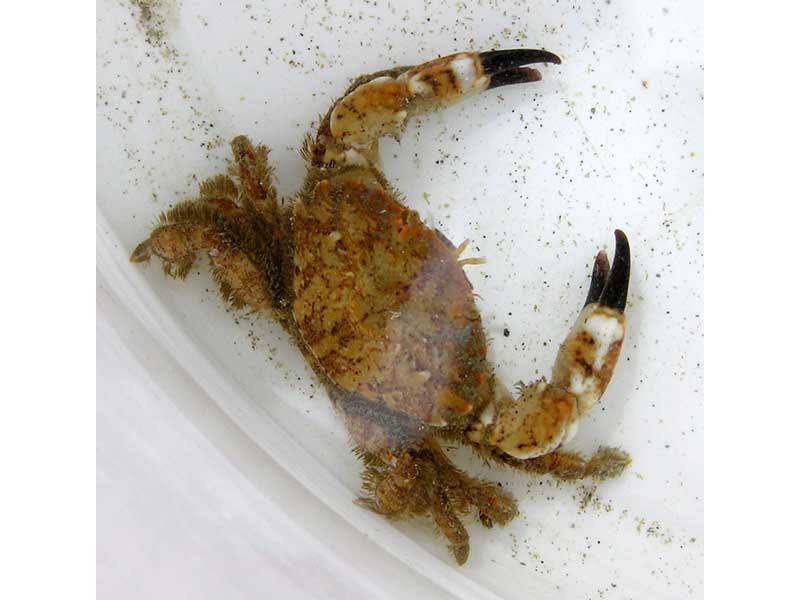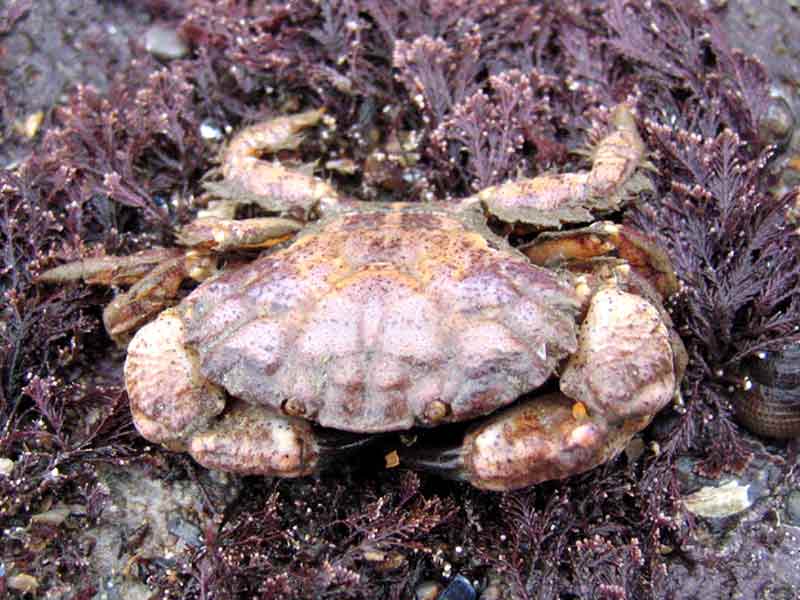Risso's crab (Xantho pilipes)
Distribution data supplied by the Ocean Biodiversity Information System (OBIS). To interrogate UK data visit the NBN Atlas.Map Help
| Researched by | Marie Skewes | Refereed by | Admin |
| Authority | A. Milne-Edwards, 1867 | ||
| Other common names | - | Synonyms | - |
Summary
Description
The carapace is flat with a smooth dorsal surface, and is up to 3 cm in length. A pair of broad sub-median lobes are present between the eyes. Antero-lateral margins of carapace with 5 obtuse teeth, all hairy on the underside. Chelipeds stout and slightly unequal. Dorsal surface of carapace yellowish with patches of red. Chelipeds and walking legs yellowish; propodus and dactylus of chelipeds brown.
Recorded distribution in Britain and Ireland
Reported from the west coasts of Britain as far north as Shetland and found on the southwest coast and the vicinity of the Thames.Global distribution
Extending from the British Isles north to west Norway and Sweden and south to the Mediterranean and West Africa.Habitat
Found on the lower shore of sandy and stony beaches to 110 m.Depth range
-Identifying features
- The 3rd to 4th pairs of antero-lateral teeth separated from each other by an inwardly directed and distally broadened depression.
- Outer surfaces of cheliped segments often with short transverse grooves bordered by very flat tubercles that are sometimes arranged in a 'scale-like' manner.
- Dorsal and outer faces of propodus each bear a shallow longitudinal excavation.
Additional information
Can be distinguished from the closely related Xantho hydrophilus by the presence of a dense fringe of hair on the lateral and posterior margins of the carapace and on the walking legs.
Listed by
- none -
Bibliography
Crothers, J. & Crothers, M., 1988. A key to the crabs and crab-like animals of British inshore waters. Somerset, England: Field Studies Council. [AIDGAP guide, no. 155.]
Fish, J.D. & Fish, S., 1996. A student's guide to the seashore. Cambridge: Cambridge University Press.
Hayward, P., Nelson-Smith, T. & Shields, C. 1996. Collins pocket guide. Sea shore of Britain and northern Europe. London: HarperCollins.
Hayward, P.J. & Ryland, J.S. (ed.) 1995b. Handbook of the marine fauna of North-West Europe. Oxford: Oxford University Press.
Hiscock, K., Southward, A., Tittley, I., Jory, A. & Hawkins, S., 2001. The impact of climate change on subtidal and intertidal benthic species in Scotland. Scottish National Heritage Research, Survey and Monitoring Report , no. 182., Edinburgh: Scottish National Heritage
Howson, C.M. & Picton, B.E., 1997. The species directory of the marine fauna and flora of the British Isles and surrounding seas. Belfast: Ulster Museum. [Ulster Museum publication, no. 276.]
Ingle, R., 1997. Crayfishes, lobsters and crabs of Europe. An illustrated guide to common and traded species. London: Chapman and Hall.
Ingle, R.W., 1980. British Crabs. Oxford: British Museum (Natural History), Oxford University Press.
JNCC (Joint Nature Conservation Committee), 1999. Marine Environment Resource Mapping And Information Database (MERMAID): Marine Nature Conservation Review Survey Database. [on-line] http://www.jncc.gov.uk/mermaid
Picton, B.E. & Costello, M.J., 1998. BioMar biotope viewer: a guide to marine habitats, fauna and flora of Britain and Ireland. [CD-ROM] Environmental Sciences Unit, Trinity College, Dublin.
Datasets
Fenwick, 2018. Aphotomarine. Occurrence dataset http://www.aphotomarine.com/index.html Accessed via NBNAtlas.org on 2018-10-01
NBN (National Biodiversity Network) Atlas. Available from: https://www.nbnatlas.org.
OBIS (Ocean Biodiversity Information System), 2025. Global map of species distribution using gridded data. Available from: Ocean Biogeographic Information System. www.iobis.org. Accessed: 2025-07-06
South East Wales Biodiversity Records Centre, 2018. SEWBReC Myriapods, Isopods, and allied species (South East Wales). Occurrence dataset: https://doi.org/10.15468/rvxsqs accessed via GBIF.org on 2018-10-02.
Citation
This review can be cited as:
Last Updated: 08/05/2008





